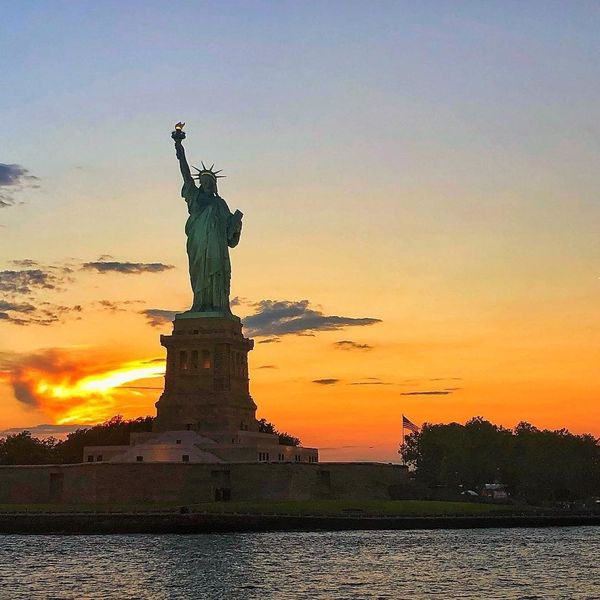Now that I have your attention, I’d like to clarify by saying that Donald Trump’s executive order is not a Muslim ban, and if it were a ban on people based on their religion, I would not support it. The executive order temporarily prohibits people from seven countries in the Middle East and Africa from traveling to the United States.
It is about demographics, not about religion.
These seven countries –Syria, Iraq, Iran, Libya, Sudan, Somalia, and Yemen– were labeled “countries of concern” by the Obama administration; they are tied to terrorism and either war-torn or harboring disdain towards the United States (x). Because they are predominantly Muslim, the order has been falsely described as a “ban on Muslims.” According to a 2010 Pew Research study, Muslims make up over 50% of the population in 49 countries (x). If this were a ban on Muslims, wouldn’t only Muslims be affected (x)? Wouldn’t there have been more than a mere seven countries– and larger countries with higher Muslim populations– placed on the list?
Keep in mind, it is a temporary ban.
The order places a 90-day ban on nearly all travelers from these seven countries. It also halts refugee admissions for 120 days, then places an admission cap at 50,000 refugees per year (x). During this period, the Trump administration will improve security screening in order to prevent admitting potential threats to our country. This includes “those who do not support the Constitution, or those who would place violent ideologies over American law” as well as “those who engage in acts of bigotry or hatred (including "honor" killings, other forms of violence against women, or the persecution of those who practice religions different from their own) or those who would oppress Americans of any race, gender, or sexual orientation” (x) from entering our country. The United States must increase vigilance in the visa issuance process. FBI Director James Comey admitted that there is a knowledge gap when it comes to vetting Syrian refugees and citizens from countries for which we do not have a wide database of information (x). The process must be reviewed and revised so that it works better to gather information and prevent terrorist attacks by foreigners admitted into the United States. Remember: those who are seeking refuge, safety, and overall better lives are not permanently banned from coming here; once the Trump administration devises a better process for vetting people coming into our country, these people will be allowed in.
Until the FBI can accurately screen refugees and people looking to come here, it is in the best interest of American citizens to not risk allowing potential threats into the country, no matter how few there may actually be.
The threat of terrorism is very real. There are terrorist attacks committed frequently around the world, and according to the White House, there are many attacks that are underreported, which contributes to the downplaying of the threat at hand (x). The threat of terrorism is not something we can afford to take lightly. There have been too many instances –even one instance, in my opinion, is one too many– where foreign-born individuals, or family members of these individuals, “have been convicted or implicated in terrorism-related crimes since September 11, 2001” (x) . This includes people given visas as well as people resettled here as refugees. Tamerlan Tsarnaev passed a U.S. citizenship test three months before he and his brother set off bombs at the Boston Marathon in 2013 (x). San Bernardino shooter Tashfeen Malik was approved for a green card in 2015 (x). Seddique Mir Mateen, the father of Omar Mateen, the Orlando nightclub gunman, has “well-known anti-American views and is an ideological supporter of the Afghan Taliban” (x), but immigrated to the United States from Afghanistan and was approved for citizenship in 1989 (x). Yes, I am aware that these people came to the United States from countries that are not on the ban list. However, this shows that there are flaws in our current vetting process, and the temporary ban gives the government time to figure out a better screening process.
After all, being able to come to America is a privilege, not a right.
It is neither racist nor Islamophobic to want stronger measures to be taken to ensure that people with anti-American values are not admitted into the United States. A non-immigrant (someone given the right to reside temporarily in the United States) holds a visa; an immigrant (someone given the right to reside permanently in the United States) holds a green card (x). People who have already gone through the screening process and who have been granted visas or green cards will not be affected. Despite the initial confusion, the ban is not applied to current green-card holders. The White House Chief of Staff Reince Priebus emphasized this on January 29th on NBC’s Meet the Press (x).
It is the job of the president to put the safety of the American people over the safety of people around the world.
It is known that terrorists are trying to infiltrate the ranks of refugees and other visitors (x). Radical Islamic terrorism is a threat to the United States, and Donald Trump is keeping his promise to keep his citizens safe. Under Title 8, Chapter 12 of the United States Code, §1182 gives the President the power to, “for such period as he shall deem necessary, suspend the entry of all aliens or any class of aliens as immigrants or nonimmigrants, or impose on the entry of aliens any restrictions he may deem to be appropriate” (x). So, yes, he has the authority to temporarily halt immigration from these regions, which he has done in order to improve security screening and get better control over threats to the country and its people. While Trump plans to admit fewer refugees than Obama did in 2016, Trump’s contraction of refugee admittance is not “a departure from recent norms.” Rather, it “stands roughly in between a typical year of refugee admissions in George W. Bush’s two terms and a typical year in Obama’s two terms” (x). Donald Trump is doing as presidents of the past – including President Obama– have done. He is using his authority to increase security and to put a halt on immigration from areas of potential danger.
As President Trump said, “this is not about religion– this is about terror and keeping our country safe.” I am not heartless, hateful, or Islamophobic for supporting this statement.
I stand with the majority of Americans who support the temporary ban on immigration (x). I don't support banning people based on their religious beliefs, nor do I support prioritizing one religion over another. I do support establishing safe zones, providing aid and support to people in war-torn areas, and admitting refugees once we have better security. As individuals, we can donate money and supplies to and volunteer in these countries to provide support and put an end to the barbaric acts going on in these countries. But as President of the United States, it is Donald Trump's responsibility to prioritize the safety of his citizens over the safety of people in other countries. After the temporary halt on immigration, people from these countries will still be able to seek refuge here. Unfortunately, the hysterical rhetoric and flat out lies spread by the media and the left show that people would rather deny the facts and have American lives put in danger, than see Donald Trump succeed.





















